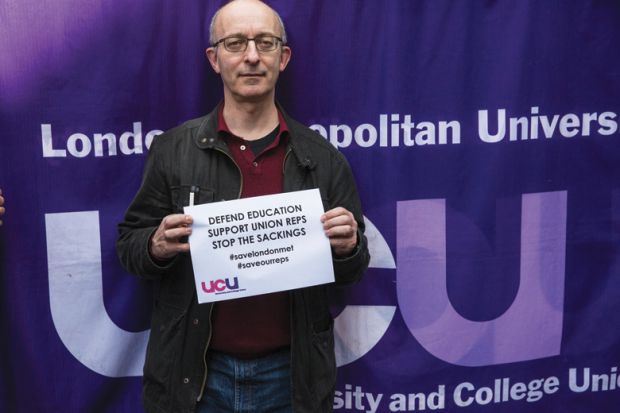Two high-profile trade union activists at London Metropolitan University have been “unfairly singled out” for redundancy because of their union activities, it has been claimed – an allegation dismissed as “baseless” by the institution.
Mark Campbell, president of London Met’s University and College Union branch, and David Hardman (pictured above), the branch secretary, said that they were dismayed to be among a handful of staff selected for compulsory redundancy in a university efficiency drive.
While the cost-cutting exercise, announced in March 2015, has led to the loss of 93 full-time equivalent staff from London Met, most employees have either taken voluntary redundancy or a job elsewhere. Only the equivalent of 14 staff will face compulsory redundancy – of which they are two, the pair said.
Mr Campbell – a vocal critic of London Met’s various plans over the years, including its recent decision to relocate its Cass creative arts school – told Times Higher Education that he had “every intention of fighting what I, and very many others, believe to have been a flawed selection process that has unfairly singled David and myself out because of our trade union work”.
More than 1,500 people have already signed an online petition against “job cuts and trade union victimisation” at London Met, whose student union leaders have also condemned the redundancy move.
However, a London Met spokesman rejected the suggestion that the pair’s selection for redundancy had anything to do with their UCU involvement, calling the claim “baseless”.
As home to the library of the Trades Union Congress, London Met had a “proud tradition of recognising the important role that unions play in British society”, he said.
“To suggest that the university is ‘anti-trade union’ could not be further from the truth,” he added.
Dr Hardman, a principal lecturer in learning development who has worked for the university since 1998, said that he was concerned by the “completely opaque process” used to select candidates for redundancy.
The feedback that he had received from the university made no reference to his work as an official UCU health and safety officer, which required him to conduct safety inspections and undertake institution-wide surveys on stress, workload and bullying, Dr Hardman added.
“I have spent a couple of hundred hours on these duties alone last year,” he said, arguing that the failure to acknowledge this work would place union representatives at a disadvantage when facing such procedures.
“It seems most selected [for redundancy] are those who are more outspoken and critical of management, which makes you think it’s not just about teaching, but getting rid of those who are a nuisance,” he said.
The university spokesman said that redundancies are “based on clear criteria and carried out following consultation and due process”.
“Staff who are members of a trade union do not enjoy special treatment by being exempt from selection for redundancy, nor are they at any increased risk of redundancy,” he added.
The job cuts are part of efforts to reduce staff costs from 63 per cent of expenditure – one of the highest rates in the country – to 54 per cent by the end of 2016-17, and this drive has recently seen outlay on senior management cut by a third (£600,000), the spokesman added.




